YCD&C Co-Directors at the Neuhaus Education Center
On April 11th, Yale Center for Dyslexia & Creativity Co-Directors Sally Shaywitz, MD and Bennett Shaywitz, MD were honored by the Neuhaus Education Center by delivering the Lenox M. Reed Seminar. What made this an especially warm event was the educator, Lenox M. Reed was actually present and we were able to hear directly from some of the many whom she had taught/tutored and brought into the sunshine that comes with learning to read. We were particularly touched to be honored by the renowned Neuhaus Center.
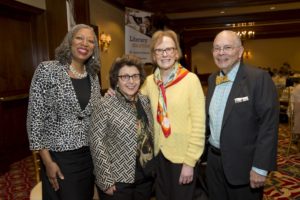
Since 1980, the Neuhaus Education Center in Bellaire, Texas has provided evidenced-based reading instruction to more than 60,000 reading teachers and served thousands more parents and adult learners. Its mission includes preventing reading failure by providing teachers of all students with professional development in evidence-based methods of reading instruction. The Center’s Annual Benefit and the Lenox M. Reed Seminar raise significant funds and honor Neuhaus’ incredible Dyslexic Specialists.
It was inspiring to enter the ballroom and view the smiling, excited men, women and children filling over three hundred seats.
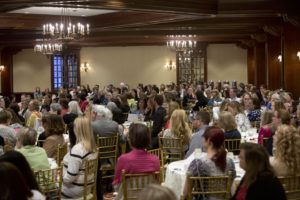
When, as a speaker, you see such enthusiasm it warms your heart and encourages you to put out even more energy to ensure that the new knowledge of dyslexia is clear and can be applied to help the many far-too-often overlooked dyslexic children and adults. The lecture presented was on a highly relevant and timely topic — Dyslexia: An Explanation and Potential Solution to the Education Crisis, and appeared to be very much appreciated by the rapt audience. In addition to the Lenox Reed Seminar, we were also privileged to meet and exchange ideas in a “deep dive” conversation with Dr. Tracy Weeden, President and CEO of Neuhaus, and her leadership team and staff, on the topics “What’s on your mind?” and “What are the national trends?”
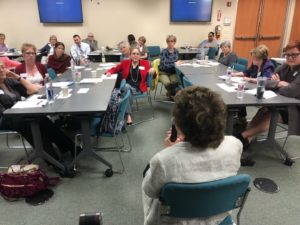
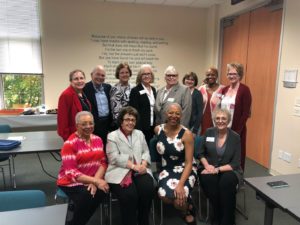
The attendees were so excited to hear about the 21st century science of dyslexia and how it applies to their child – or even to themselves. So many have spent hours and hours trying to convince their child’s school to identify and to recognize their child’s dyslexia, only to be met with denial or even with outrageous statements such as “we don’t believe in dyslexia.” In religion one can choose what to believe in or not; dyslexia is a scientifically validated condition that is not dependent on a school’s choice to recognize or not.
We heard from so many grateful parents how wonderful it was to learn that dyslexia is, indeed, a scientifically validated unexpected difficulty in reading. Since its first description over a century ago to our most recent scientific study – the evidence is overwhelming that you can be very bright and still read slowly and be dyslexic! We especially enjoyed meeting a mom and her dyslexic triplets who were not at all surprised to hear that dyslexia affects 20% or 1 in 5 in the population, in contrast to claims by some schools that only 2%-3% of their students are dyslexic.
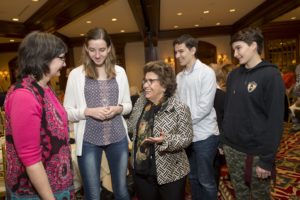
Once again, this emphasized one of our major mantras: “To be counted, one must first be identified.”
Perhaps what was of paramount interest to all was our data indicating that the achievement gap between typical readers and dyslexic readers is already present and persistent at grade one – yes, grade one. This finding has important implications: you can’t wait. Dyslexia must be screened for and identified early on. This information inspired us to develop an evidence-based screener, the Shaywitz DyslexiaScreen, that is specifically developed to bring teachers into the process and capture their important knowledge of the child. Teachers complete a series of questions about the child’s reading. There are separate screeners, for example, for kindergarten (10 items), for first grade (12) and later grades as well; the screeners, take five to ten minutes to complete on a tablet, and teachers can quickly see if their students are “at-risk” or “not at-risk.” Educators at the conference were particularly pleased to learn that teachers, based on their knowledge of having worked with the child to try to teach him or her to read, can complete the screener without taking the child away from his or her class work.
A high-point was our meeting with the Neuhaus leaders and staff who were so excited by the information they heard. The data were especially helpful to these Neuhaus individuals who work hard to expand the Neuhaus footprint nationally and bring their knowledge to educators throughout the nation. Some of what they heard reinforced their views and much else we presented expanded their views with new information which they embraced, often stating “this makes so much sense, it is so clear.”
Finally, as you can see the accompanying images, it was personally very gratifying to me and Dr. Bennett Shaywitz to see the dizzyingly long lines circling around corners and winding down corridors filled with individuals who had brought their own or a friend’s copy of Overcoming Dyslexia for me to sign, often once again with a new date and message. The warm exchange of smiles and hugs was wonderful.
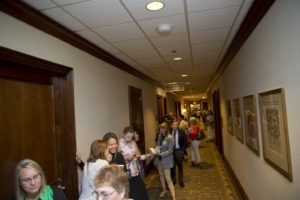
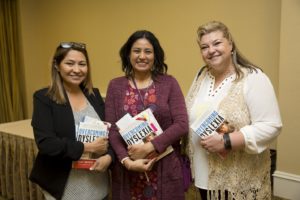
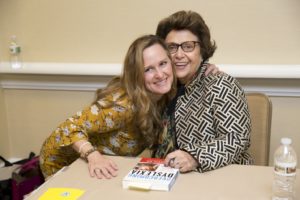
We are so grateful to Dr. Weeden and her staff, especially Rayanne Darensbourg and all those who attended this inspiring event. We must all join together to increase public awareness of the true nature of dyslexia as a paradox, an unexpected difficulty in an individual who has the ability to be a much better reader. We continue to be excited and proud that the Yale Center for Dyslexia & Creativity is leading the movement to fill the “action gap” in translating 21st century scientific knowledge into educational practice.
Please join us to strongly encourage school policy makers, educators and all others to align education with 21st century science. Our children cannot wait!!
Sally Shaywitz MD, Co-Director, Yale Center for Dyslexia & Creativity 5/10/2018
Related
In Praise of Breadth
We are excited to share with our YCDC family this new commentary, which is especially important for parents of a dyslexic child.
Read MoreNew Dyslexia Advocacy from Sen. Bill Cassidy
As Dr. Shaywitz emphasizes, while we always seek more knowledge, we already have sufficient knowledge to do better; rather than a knowledge gap we have an action gap that we must close.
Read MoreGood News for a Wonderful Family
YCDC Co-Director Dr. Sally Shaywitz shares some exciting news for two dyslexic students.
Read MoreThe Truth About Accommodations
The recent unsettling scandal around college admissions has cast a shadow on an innocent, hard-working, group of students – those with dyslexia who are entitled to accommodations.
Read More